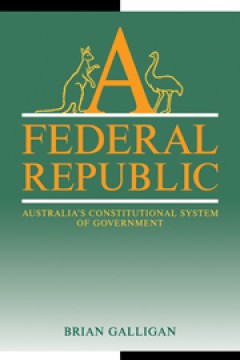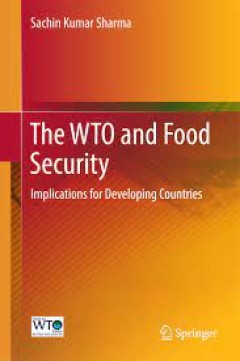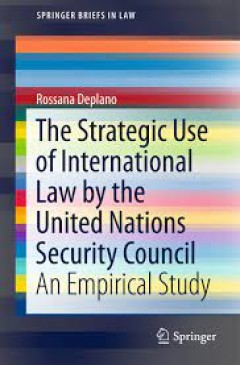Filter by

A Feminist Critique of Police Stops
A Feminist Critique of Police Stops examines the parallels between stop-and-frisk policing and sexual harassment. An expert whose writing, teaching and community outreach centers on the Constitution's limits on police power, Howard Law Professor Josephine Ross, argues that our constitutional rights are a mirage. In reality, we can't say no when police seek to question or search us. Building on …
- Edition
- -
- ISBN/ISSN
- 9781108697477
- Collation
- -
- Series Title
- -
- Call Number
- -

A Federal Republic Australia's Constitutional System of Government
This provocative book, first published in 1995, argues that Australia is already a federal republic rather than a constitutional monarchy. It argues that by adopting a federal constitution in 1901 Australians ensured their status as a sovereign people. While the book does not deny the parliamentary and monarchic elements of the Australian system, it calls for a positive reassessment of the Cons…
- Edition
- -
- ISBN/ISSN
- 9781139084932
- Collation
- -
- Series Title
- Reshaping Australian Institutions
- Call Number
- -

A Farewell to Fragmentation Reassertion and Convergence in International Law
Fragmentation has been much discussed as a threat to international law as a legal system. This book contends that the fragmentation of international law is far exceeded by its convergence, as international bodies find ways to account for each other and the interactions of emerging sub-fields. Reasserting its role as the 'principal judicial organ of the United Nations', the International Court o…
- Edition
- -
- ISBN/ISSN
- 9781139979498
- Collation
- -
- Series Title
- Studies on International Courts and Tribunals
- Call Number
- -

A Divided Republic Nation, State and Citizenship in Contemporary France
This book is an original and sophisticated historical interpretation of contemporary French political culture. Until now, there have been few attempts to understand the political consequences of the profound geopolitical, intellectual and economic changes that France has undergone since the 1970s. However, Emile Chabal's detailed study shows how passionate debates over citizenship, immigration,…
- Edition
- -
- ISBN/ISSN
- 9781107447936
- Collation
- -
- Series Title
- -
- Call Number
- -

Trade Policy between Law, Diplomacy and Scholarship Liber amicorum in memori…
This book presents 22 topical contributions on international trade law and policy, with a particular focus on EU external trade law, addressing countries ranging from Ukraine to Switzerland and the US (TTIP) and aspects from trade and IPRs to anti-dumping. The volume constitutes a state-of-the-art treatment of the many facets of trade policy in the 21st century from legal, diplomatic and academ…
- Edition
- -
- ISBN/ISSN
- 978-3-319-15690-3
- Collation
- -
- Series Title
- -
- Call Number
- -

Toward a Whole-of-Europe Approach Organizing the European Union’s and Memb…
With her research, Svenja Post offers an in-depth analysis of the implementation of the Comprehensive Approach in international crisis management both on EU and on member state national level. The author demonstrates in detail which steps have been taken on conceptual and on structural level by the EU and its member states Great Britain, Germany and Sweden to organize and realize crisis managem…
- Edition
- -
- ISBN/ISSN
- 978-3-658-08023-5
- Collation
- -
- Series Title
- -
- Call Number
- -

A Democratic Bearing
In this rich analysis of the changing ideals of citizenship, Stephen K. White offers a path for the renewal of democratic life in the twenty-first century. Looking beyond passive notions of citizenship defined in terms of voting or passport possession, White seeks a more aspirational portrait, both participatory and inclusive, that challenges citizens, especially in the middle class, to confron…
- Edition
- -
- ISBN/ISSN
- 9781316717394
- Collation
- -
- Series Title
- -
- Call Number
- -

A Defence of Usury
The utilitarian philosopher and jurist Jeremy Bentham (1748–1832) argues in this collection of letters for the cessation of government control of the rate of interest. The work first appeared in 1787 and is reissued here in the version published in Dublin in 1788. The final letter, addressed to Adam Smith, is a response to Smith's Wealth of Nations (1776), arguing against the limits to invent…
- Edition
- -
- ISBN/ISSN
- 9781107358447
- Collation
- -
- Series Title
- -
- Call Number
- -

The WTO and Food Security Implications for Developing Countries
This book examines the public stockholding policies of selected developing countries from the perspective of WTO rules and assesses whether the provisions of the Agreement on Agriculture (AoA) could hamper these countries’ efforts to address the challenges of food security. Further, it highlights the need to amend the provisions of the AoA to make WTO rules just and fair for the millions of p…
- Edition
- -
- ISBN/ISSN
- 978-981-10-2179-4
- Collation
- -
- Series Title
- -
- Call Number
- -

The Strategic Use of International Law by the United Nations Security Council…
The book offers insights on whether international law can shape the politics of the Security Council and conversely, the extent to which the latter contribute to the development of international law. By providing a systematic analysis of the quantity and quality of international legal instruments referred to in the text of resolutions, the book reconstructs patterns of the Security Council’s …
- Edition
- -
- ISBN/ISSN
- 978-3-319-21281-4
- Collation
- -
- Series Title
- -
- Call Number
- -
 Computer Science, Information & General Works
Computer Science, Information & General Works  Philosophy & Psychology
Philosophy & Psychology  Religion
Religion  Social Sciences
Social Sciences  Language
Language  Pure Science
Pure Science  Applied Sciences
Applied Sciences  Art & Recreation
Art & Recreation  Literature
Literature  History & Geography
History & Geography